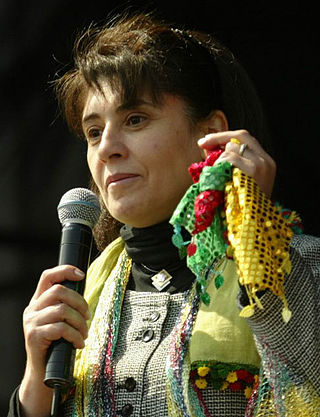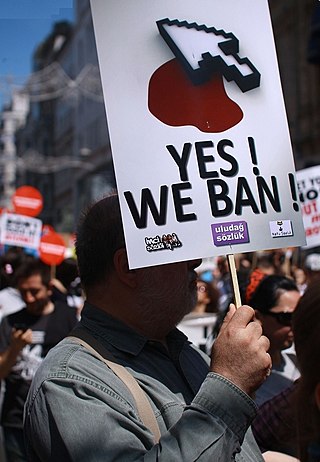Related Research Articles

Leyla Zana is a Kurdish politician. She was imprisoned for ten years for her political activism, which was deemed by the Turkish courts to be against the unity of the country. She was awarded the 1995 Sakharov Prize by the European Parliament but was unable to collect it until her release in 2004. She was also awarded the Rafto Prize in 1994 after being recognized by the Rafto Foundation for being incarcerated for her peaceful struggle for the human rights of the Kurdish people in Turkey and the neighbouring countries.
Murat Belge is a Turkish academic, translator, literary critic, columnist, civil rights activist, and occasional tour guide.

Osman Baydemir is a Kurdish politician, lawyer and human rights activist. He was the mayor of his home town of Diyarbakır from 2004 to 2014. He was a member of the Grand National Assembly of Turkey for the Peace and Democracy Party (BDP) and also the Peoples Democratic Party (HDP).

Censorship in Turkey is regulated by domestic and international legislation, the latter taking precedence over domestic law, according to Article 90 of the Constitution of Turkey.

Ahmet Hüsrev Altan is a Turkish journalist and author. A working journalist for more than twenty years, he has served in all stages of the profession, from being a night shift reporter to editor in chief in various newspapers.
Taraf was a liberal newspaper in Turkey. It had distinguished itself by opposing interference by the Turkish military in the country's social and political affairs. It was distributed nationwide, and had been in circulation since November 15, 2007. On July 27, 2016, the newspaper was closed under a statutory decree during the state of emergency after the 2016 Turkish coup d'état attempt, due to its links with the coup plotters' Gülen movement.
Orhan Miroğlu is a Turkish politician of Mhallami origin and columnist for Taraf and Today's Zaman.

The Kurdistan Communities Union is a Kurdish political organization committed to implementing Abdullah Öcalan's ideology of democratic confederalism. The KCK also serves as an umbrella group for several confederalist political parties of Kurdistan, including the Kurdish militant political organization and armed guerrilla movement Kurdistan Workers' Party (PKK), Democratic Union Party (PYD), Kurdistan Free Life Party (PJAK), and Kurdistan Democratic Solution Party (PÇDK). Finland and Sweden's alleged support for the KCK, is one of the points which caused Turkey to oppose Finland and Sweden's NATO accession bid.
Operation Sledgehammer is the name of an alleged Turkish secularist military coup plan dating back to 2003, in response to the Justice and Development Party (AKP) gaining office.
Orhan Doğan was a Kurdish human rights lawyer and politician of the Democratic Society Party.
Ocak Işık Yurtçu was a Turkish reporter detained for thirty-two months between 1993-1997 by the Turkish government for his reporting on the Kurdish–Turkish conflict, a case The New York Times called "emblematic" of the Turkish press's struggle for press freedom in the 1990s.
Özgür Gündem was an Istanbul-based daily Turkish language newspaper, mainly read by Kurds. Launched in May 1992, the newspaper was known for its extensive reporting on the Kurdish-Turkish conflict, and was regularly accused of making propaganda for the Kurdistan Workers' Party (PKK). Its editors and staff have frequently been arrested and prosecuted, which resulted in multiple publication bans. Since April 1994, the publication continued under different names until Özgür Gündem was relaunched in 2011.
Ahmet Alper Görmüş is a Turkish journalist and writer, formerly a columnist for Taraf and Yeni Aktüel. He was the editor-in-chief of the news weekly Nokta (2006–7).

Kemal Burkay is a writer and politician.

İbrahim Ayhan was a Turkish politician of Kurdish origin and a former Member of Parliament for Şanlıurfa.
Turkey's media purge after the failed coup d'état on July 15, 2016 resulted in the shutdown of at least 131 media outlets and the arrest of 117 journalists – at least 35 of whom have been indicted for "membership in a terror group".
Doğan Güzel is a Kurdish Turkish-born cartoonist. He is best known for his satirical comic strip Qirix.

Yaşar Kaya was a Turkish-Kurdish politician and publisher of the pro-Kurdish newspaper Özgür Gündem. Together with authors like Ismail Besikçi and Musa Anter, he was a co-founders of the Kurdish Institute of Istanbul in 1992.
References
- 1 2 Today's Zaman, 15 January 2013, Çalışlar becomes Taraf's new editor-in-chief
- 1 2 3 "Council of Experts | Democratic Progress Institute" . Retrieved 21 December 2020.
- 1 2 "Committee to Protect Journalists Is Outraged By Conviction of Journalist Oral Calislart". Committee to Protect Journalists. 19 May 1999. Retrieved 3 July 2020.
- ↑ Panico, Christopher; Watch (Organization), Human Rights (1999). Turkey: Violations of Free Expression in Turkey. Human Rights Watch. pp. 57–58. ISBN 978-1-56432-226-5.
- ↑ "Turkey: For American Reporter Facing Jail, There's Blame on All SIdes". Committee to Protect Journalists. Retrieved 21 December 2020.
- ↑ Frantz, Douglas (30 September 2000). "Turkish Journalist Cleared of Insulting Army". The New York Times. ISSN 0362-4331 . Retrieved 3 July 2020.